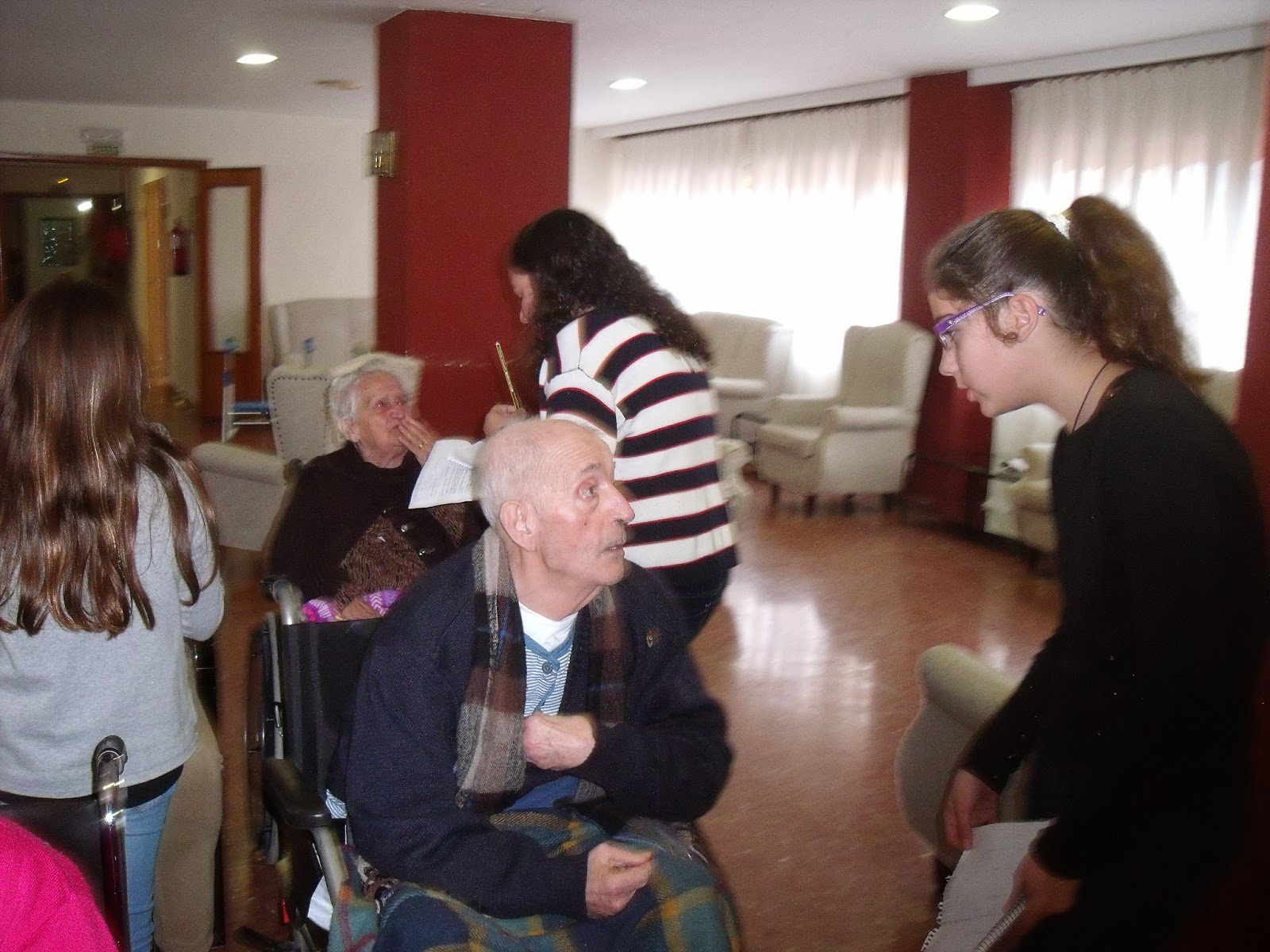lunes, 17 de febrero de 2014
sábado, 8 de febrero de 2014
CONVIVIENDO CON LOS MAYORES
Spending time with elderly people

Tartessos adelanta el Día de los Mayores(coincide con periodo de vacaciones escolares-Julio-).
Los alumnos viven una experiencia única con "mayores" que residen en un hogar de la Tercera Edad. El personal técnico les enseñó las distintas dependencias: lavandería, comedor, cocina, etc...Además conocen las actividades lúdicas y ocupacionales en las que participan los residentes. Y lo más importante, las características(limitaciones, necesidades y cuidados) de estas personas.
Todos lo pasaron bien. Descubrieron el valor de estas personas, la necesidad de acercarse a ellas y respetarlas,y sintieron muy cerca su afecto.
Our school brings forward "the Elderly people Day" that we celebrate in July in our calendar. Last week we visited a place for Third Age in our city. The students lived an unique experience with the elderly people who are living in a Residence .
The staff showed us the different facilities: laundry, dining-room, kitchen, ... Also, the students knew the activities(school, dancing, cards...) that the old people do and the characteristics they have got such as: their necessities, cares and difficulties.
The group of students carried out some entertaiment activities (quizes, games of magic and songs) in order to spend time with them . Then, they finished with the main activity : the interviews. We all had a good time, and felt mutual affection. Pupils discovered the value of this people and the importance to respect them..
(Tartessos schol 30th January: School Day of non Violence and Peace)
Una vez más, continuamos con las celebraciones de nuestro Proyecto; ahora, enero de 2014, el Día Escolar de la no Violencia y la Paz (DENIP). La novedad de este curso ha sido la elaboración por los alumnos del monumento que muestran las fotografías; además, desde los más pequeños hasta los mayores, participaron en las múltiples actividades que se llevaron a cabo: lectura de poemas, canciones,elaboración de murales y, finalmente, suelta de palomas.

One more year, we continue with the celebrations in our project. This time, January 2014, The School Day of Non-Violence and Peace. The novelty this year has been the "monument to the peace" that children made with wraped boxes with poems, pictures and peaceful messages. Other activities were: murals, songs and the release of some doves. All the school from the little children to the oldest ones took part in this event in the playground.
miércoles, 25 de diciembre de 2013
I.D.E.A.S. First section( 2013/2014)
 Durante el primer trimestre del curso escolar 2013/14,
coincidente con el primer tramo del segundo año del Proyecto Comenius IDEAS en
el que participa nuestro Colegio, hemos desarrollado las siguientes actividades:
Durante el primer trimestre del curso escolar 2013/14,
coincidente con el primer tramo del segundo año del Proyecto Comenius IDEAS en
el que participa nuestro Colegio, hemos desarrollado las siguientes actividades:
Con motivo de la celebración del Día Europeo de las Lenguas
confeccionamos un mural de Europa donde los alumnos escribieron sobre los
países correspondientes “los saludos” en la lengua del mismo.
Se celebra el Día Internacional de los Derechos del niño.
Para ello desarrollamos las siguientes actividades:
·
Conocerlos,
tanto en español como en inglés.
·
Visita
a la exposición de paneles sobre estos Derechos.
·
Booklets
confeccionados por los alumnos con los Derechos
Conmemoramos el Día Internacional de la Discapacidad. Con ese
motivo hemos llevado a cabo una variedad
de actividades:
-
Juegos:
“gallinita ciega”, para desarrollar la empatía con los invidentes.
“gusano”, ,, ,, ,, ,, ,,
los discapacitados motores
“mimo” , ,, ,, ,, ,, ,,
los discapacitados auditivos
 -
Aprendizaje
de un vocabulario básico del Sistema Braille, así como palabras y letras por
medio del lenguaje gestual.
-
Aprendizaje
de un vocabulario básico del Sistema Braille, así como palabras y letras por
medio del lenguaje gestual.
-
Vídeos:
Hemos visto y comentado documentales y dibujos animados sobre “Asperger”, “Trastorno
de Déficit de Atención” y “Gente Ciega”.
-
Charlas
informativas, impartidas por expertos, sobre la Discapacidad.
-
Visita
al Aula específica de Discapacidad: los alumnos han elaborado composiciones
acerca de la misma.
 SThe Universal Children's Rights Day (November, 20th) is an important event in our project and we have commerated it with some activities.
SThe Universal Children's Rights Day (November, 20th) is an important event in our project and we have commerated it with some activities.-The children have been knowing and discussing about the Children's Right.They learnt the names of the rights in two languages: English and Spanish.
--We visited an exhibition of posters about the Human Rights and in particular the Children's Rigths.
-The students have made booklets with sentences of rights and duties illustrated with pictures: 'Every boy or girl knows their rigths'.
-We decorated the corridors and the hall of the school with plenty of murals, posters and pictures related to this event.
THE DISABLED PEOPLE DAY
The Disabled People Day ( December, 3rd), is a meaningful date in the calendar of our project.
We celebrated this event doing a big variety of activities such as:
-Some games of mime to understand earing disabled people, blind people...in order to take awareness about this.
- The students have learnt a basic vocabulary of Braille System and some words or letters with the language of gestures.
- Wacthing videos, documentaries or cartoons about Asperger syndrome, Autism and other discapacities.
-Collecting sentences about how to help disabled people.
-Reading and illustrating stories related to this topic(e.g. 'The story of Lorenzo' and 'The tree without leaves'). The children invented more stories. their own ones.
-Participating in campaigns and inviting a speaker to learn about an organisation and its objectives(informative talk about the language of deaf people and visiting the special classroom where the children with difficulties in learning are in our school.

Sembrando Solidaridad: Día del Migrante (18 de Diciembre)
International Day for Migrant People
Suscribirse a:
Entradas (Atom)

































